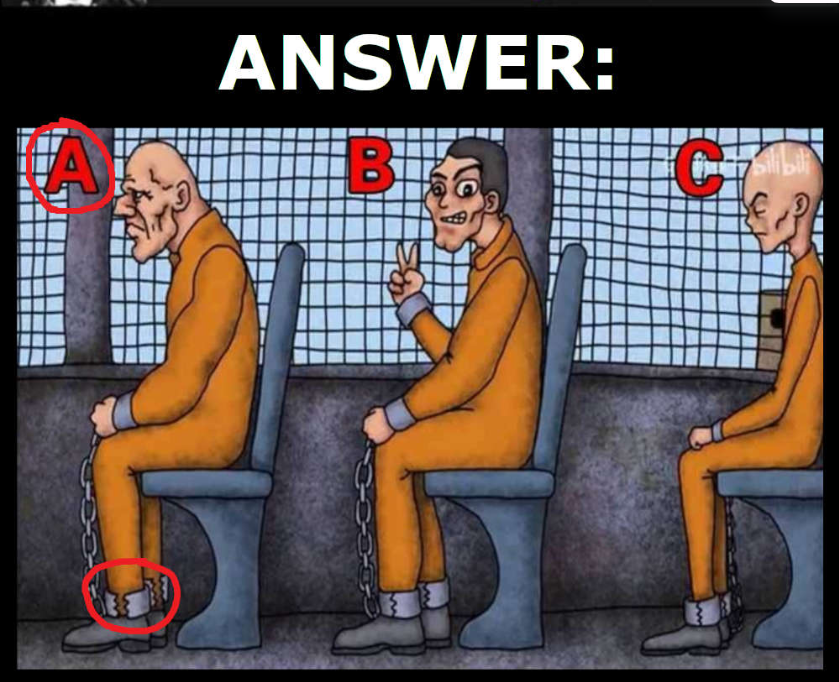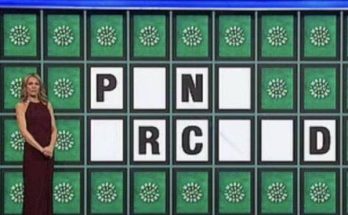
Puzzles appeal to our innate desire to solve problems and conquer challenges. They invite us to engage with them, promising a satisfying “aha!” moment when we finally crack the code. This thrill of solving something complex is what makes puzzles so addictive.
Engaging with puzzles allows us to explore realms of thinking that go beyond our daily experiences. They push us to think critically, consider different perspectives, and sometimes, question our assumptions. In doing so, puzzles help us develop new cognitive pathways and enhance our mental agility.
The riddle in question presents an image with three individuals, each seemingly trapped and in need of escape. At first glance, all three appear to be in a similar predicament, but a closer examination reveals subtle differences that hold the key to solving the puzzle.
What sets this riddle apart is the need for careful observation. While all three individuals are restrained, it’s Person A who has a slight advantage—his cuffs are not as tight as those of the others. This small detail, easy to miss, is what makes Person A the most likely to escape, offering a subtle but crucial clue to the puzzle’s solution.
Riddles are more than just fun brain teasers; they’re exercises in critical thinking and logical reasoning. Solving a riddle requires the solver to piece together various elements, often thinking outside the box to arrive at a solution. This process strengthens mental acuity and encourages creative problem-solving.
There’s a reason why solving a difficult riddle feels so satisfying—it’s the culmination of mental effort, observation, and logic coming together. This “aha!” moment is not only rewarding but also reinforces the skills we used to get there, making us more adept at tackling future challenges.
Puzzles like the “Who Can Escape?” riddle sharpen our problem-solving abilities. They require us to break down a problem into manageable parts, analyze each component, and devise a strategy to solve it. This process mirrors real-life problem-solving and enhances our ability to tackle complex challenges.
Solving puzzles demands mental flexibility—the ability to adapt our thinking and approach as we encounter new information. This flexibility is crucial not only in puzzles but also in everyday life, where we often need to shift perspectives and rethink our strategies to overcome obstacles.
Puzzles ignite our curiosity, driving us to explore and uncover hidden patterns. This natural inclination to seek out answers fosters a mindset of continuous learning and discovery. By engaging with puzzles, we nurture a desire to understand the world more deeply, leading to personal and intellectual growth.
Puzzles are more than just intellectual exercises—they’re opportunities for self-discovery. As we navigate the complexities of a puzzle, we learn about our own thinking processes, strengths, and areas for improvement. This self-awareness is a key component of personal growth.
Successfully solving a puzzle, especially one as challenging as the “Who Can Escape?” riddle, builds confidence. It reinforces the belief that we are capable of overcoming difficulties and finding solutions, a mindset that can be applied to other areas of life.
The “Who Can Escape?” riddle became a viral sensation because it combines simplicity with complexity. It’s easy to engage with, yet challenging enough to stump even the most seasoned puzzle solvers. This blend of accessibility and difficulty is what makes it so appealing and shareable.
Part of the reason puzzles like this one go viral is their social nature. People love to share challenges with friends and family, sparking discussions and debates over the correct answer. This communal aspect of puzzle-solving adds to its appeal, making it a popular pastime on social media.

Puzzles encourage us to think critically—a skill that is increasingly important in today’s complex world. By regularly engaging with puzzles, we can hone our ability to analyze information, identify patterns, and develop effective solutions.
The skills we develop through puzzle-solving are transferable to many aspects of life. Whether we’re tackling a difficult work project, navigating personal challenges, or making important decisions, the ability to think critically and solve problems is invaluable.
The “Who Can Escape?” riddle is more than just a brain teaser—it’s a testament to the power of puzzles to challenge, entertain, and educate. By engaging with puzzles like this one, we not only enhance our cognitive abilities but also unlock new ways of thinking and problem-solving. So, the next time you come across a challenging puzzle, don’t shy away—embrace it. You never know what new insights and skills you might discover along the way.



